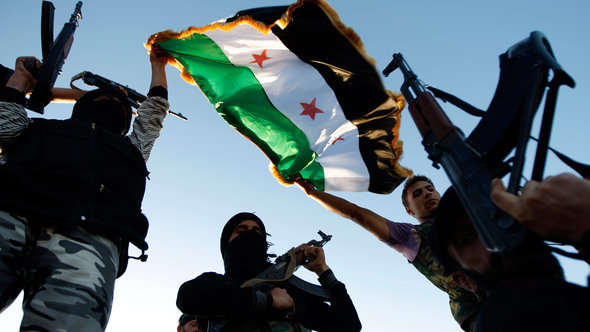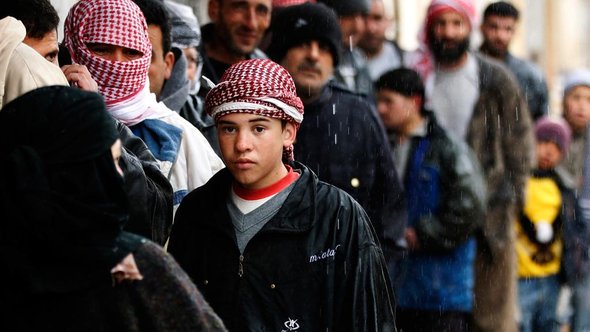''The true revolution won't come until Assad has gone''
On 15 November 2011, just a few hours before the Arab League suspended Syria, the Syrian government announced – in what was probably a show of its willingness to make concessions – the release of 1,180 prisoners. One of them was Kamal al-Labwani, a doctor, political prisoner and one of Syria's best-known dissidents. At the time of his early release, al-Labwani had completed six years of his 15-year sentence in Adra prison in Damascus.
It was already his second time in prison under Bashar al-Assad. The first time had been ten years previously, during the Damascus Spring of 2001, when hopes of a change for the better in the repressive Baath Party dictatorship in Syria grew following the death of Hafez al-Assad. At that time, al-Labwani had been one of 10 prominent members of the Syrian opposition movement close to the independent MP Riad Seif, who were working peacefully for more freedom and democracy.
The trauma of the Hama massacre
Kamal al-Labwani has never been afraid to openly voice his opinions. Ever since he witnessed the appalling massacre in Hama in 1982 while completing his military service as a doctor, he decided to dedicate himself to working against the Syrian regime, which had shown itself capable of doing such unspeakable things to its own people.
Because of his active involvement in the Damascus Spring, he spent three years in solitary confinement and had barely any contact with the outside world. When he was released from prison in September 2004, very little remained of what had been the hugely promising Damascus Spring movement. Nothing had come of the pious promises of Western states to push for more democracy in the region. These promises had obviously been forgotten in the light of the debacles in Iraq and Afghanistan.
"I know that the Europeans are not evil," says al-Labwani. "But the governments there often only think of their short-term gains. This is a negative aspect of democracy; it means that people only think about the short term and don't take the future into account. But politics only works when it is built on inalterable political and moral principles."
Trying to rally support in the West
He decided to travel to Europe and the USA to canvas renewed support for the pro-democracy movement: "I tried to convince foreign governments that dictatorships breed violence and fanaticism, and that Islam was not the problem. I asked them to support the ideas behind the Damascus Spring and the Damascus Declaration, which were in line with their own principles and ideas: democracy, human rights, liberalism." Although his words did not fall on deaf ears, the declarations of support he received from the White House and the European Parliament were not enough for him.
In November, he returned to Syria, knowing that his actions would have consequences. However, in order to increase the pressure on foreign governments, he was willing to accept these consequences. He was arrested as soon as he arrived at the airport and sentenced to 12 years in prison, among other things for "communication with a foreign state to encourage an attack on Syria" and for the "dissemination of false information". The BBC reported on the announcement of the verdict: "Correspondents say Dr al-Labwani looked shocked for a few seconds as the judge pronounced the verdict, then gave a faint smile and raised his fist in the air, without speaking."
He had previously spoken in his own defence, once again pointing the finger at the government and calling for reforms. This speech led to his sentence being increased by a further three years in 2008.
Dreams coming true, and a change of mind
The start and the first few months of the revolution almost passed him by completely. In prison, very little information filtered through to him. His joy, therefore, was all the greater when he was allowed to leave the prison in November 2011: "I saw that all my dreams were in the process of coming true. Perhaps even more than I had dared to hope."

At the same time, however, he noticed that developments triggered a change in him. Al-Labwani had always been a champion of violence-free, peaceful protests, but the brutality the regime used against its opponents made him change his mind.
"What is the right to life worth if there is no right to self-defence? The flood of videos and images on the Internet shows quite clearly the scale of the crimes committed by the government. How could the opposition possibly react calmly to that? Syrian men consider it their duty to protect the lives of their families and their own rights with weapons, especially seeing as the Syrian people have been left entirely on their own and have received no support whatsoever from outside."
He cannot understand the lack of action on the part of the United Nations. He is particularly disappointed in the UN Security Council. "It's just not possible that 120 states decide to help Syria and yet one state can prevent them from doing so with its veto. There should be no veto on human rights and human life! I am sorry to say it, but among Syrians, al-Qaeda is more popular than the United Nations. And who can blame them?"
Food, medicine, and money
Nevertheless, he is strictly against the deployment of NATO or UN soldiers; he considers the risks of an occupation scenario ending in chaos to be too great. In addition to heavier sanctions against the Assad regime and greater political support for the opposition activists, the help the Syrian opposition should get from other states is above all of a material nature. Although he is not asking for weapons ("Don't worry; we are already getting them from Libya and Saudi Arabia"), he is in favour of Europe facilitating the smuggling of weapons from Turkey.
No, he says, more than anything else, the Syrian people need food, medicine, and money; money to strengthen society from within and to rebuild it. "Above all, it is important to support the local councils currently being established by the opposition because they will be in a position to prevent chaos after the regime has been toppled." Support on condition that moral principles are observed, including the protection of minorities.
Syrians' tradition of religious tolerance
Al-Labwani does not think that the fear of minority groups in Syria that a major interreligious civil war will break out if Assad is overthrown is justified. He is convinced of the religious tolerance of his people. "Christians, Jews and Muslims – both Shia and Sunni – have been living together in this region for 2,000 years and there has never once been violent conflicts between them. So why should there be one now?"
When the French withdrew from Syria in the year 1946, he says, there was no persecution of Christians, even though the Christians had enjoyed a privileged position under French rule. On the contrary, Syria's first prime minister after the country gained independence was a Christian. Of course, he says, there is no denying the present conflict between Shia (especially Alawites) and Sunnis, but this conflict was created by the regime – and it will disappear with the regime.
Asylum in Sweden

When he was released from prison in November 2011, he and his family were granted asylum in Sweden. Naturally, he is relived to know that his wife and three children are in safety, "but that is only my immediate family. My extended family, the Syrian people, is suffering. Nowhere is safe; no one knows where the bombs will strike. No one lives in his own house because lots of houses have been destroyed or are situated in districts where it is too dangerous to live."
"There is no normality," he goes on to say. "The only thing that people are worried about is where they can get a hold of essential things like water, food or electricity and how they can protect themselves and their families. It is, however, important that people stay in the country; because when they flee to other countries, they are yielding ground to the regime."
Return to the battle-zone
This is why al-Labwani wants to travel to Istanbul and from there, over the border into Syria, at least into the northern part of the country, which is controlled by the Free Syrian Army. "In order to help the Syrian people and the revolution, you have to know exactly what the situation in the country is. You cannot rely on reports; you have to see it with your own eyes." He acknowledges that this is a dangerous plan, but says it is necessary.
This is the reason why al-Labwani left the Syrian National Council. "The members of the SNC are not really the opposition; they are not real Syrians. They live outside the Syrian border and have done so for quite some time now. They have no links to the Syrian people and do not know what the situation in the country is. How could they lead this revolution? All they want is money, power and influence."
The foreign states are not at all happy about this; they would much prefer to know right now who will form a government once Assad is gone, for example the members of the SNC. "But that is wrong!" says al-Labwani. "There is a Syrian people; they will decide for themselves who will govern them. They will chose the person they want. It is their job, not the job of Western states."
And if, he adds, it is the Islamists who come to power, then so be it. That is the decision of the people, and it must be accepted, because this is a step on the road to a democratic change; a change that has to be completed within society and cannot be dictated from above.
After Assad, a new revolution
As far as al-Labwani is concerned, the end of Assad will not, however, be the end of the revolution. On the contrary.
"The true revolution will come after Assad. We have to change the mentality in society that brought forth this regime and allowed it to exist and to stay in power for so long. The people there do not know what democracy or human rights mean because they have never experienced them. For five decades, society was "frozen"; now it has exploded. The people want freedom and dignity; they are not yet sure how to get there; they have to find the way themselves. It is a process that will take time."
Ten, fifteen years. That's how long it will take before one can really speak of stability in the Middle East again. And this is only on the condition that the values and principles highlighted by the revolution are really taken on board by the people in the Middle East.
So what is al-Labwani's dream? A confederation of states like the European Union or the United States. "We will build the Middle East anew right from scratch. This is the basis for stability, peace, and prosperity in the Middle East; a common economy, a common law. It will not be based on a single religion or ideology, but on common moral principles and principles in general."
Laura Overmeyer
© Qantara.de 2012
Translated from the German by Aingeal Flanagan
Editor: Lewis Gropp/Qantara.de
